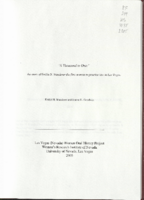Search the Special Collections and Archives Portal
Search Results

Transcript of interview with Norman Forsythe by Steve Flint, March 19, 1981
Date
Archival Collection
Description
Text

Mario C. Monaco interview, March 12, 1981: transcript
Date
Archival Collection
Description
On March 12, 1981, Kim Rhodes interviewed Mario C. Monaco (born in Italy) about his life as an educator in Las Vegas, Nevada. During the interview, Monaco speaks about his various teaching positions, how he ended up in Las Vegas, the changes seen in the Clark County School District and how it compares to educational districts throughout the nation. Moreover, Monaco discusses wages and teacher education opportunities, sports and extracurricular activities in school, community involvement, and racial integration through busing. Lastly, Monaco talks about his appointment to Director of Vocational Education in the Clark County School Districts, the programs offered by the vocational center in the valley and the importance of education.
Text

Transcript of interview with William E. "Bilbo" Helms by Denise Wolff, March 4, 1980
Date
Archival Collection
Description
On March 4, 1980, collector Denise Wolff interviewed truck driver and teacher, William E. “Bilbo” Helms (born on December 7th, 1932 in Memphis, Tennessee) in an office room at Bonanza High School in Las Vegas, Nevada. This interview covers the transformation, growth, and development of the public education system in Las Vegas, Nevada.
Text

Transcript of interview with Dr. Holbert H. Hendrix by Keith Thomas, February 20, 1979
Date
Archival Collection
Description
On February 20, 1979, Keith Thomas interviewed Dr. Holbert H. Hendrix (born 1914 in French Lick, Indiana) about his life in early Las Vegas, Nevada. The interview takes place at the University of Nevada, Las Vegas in Room 312 of the Education Building. Dr. Hendrix first discusses his personal background and interests, as well as his occupational background in teaching. The two discuss changes at the University of Nevada, Las Vegas, including construction, when the university began awarding degrees, and Dr. Hendrix’s reasons for moving to Las Vegas. Dr. Hendrix then describes changes to the Strip and how the hotel industry has changed since he first arrived in Nevada. The two briefly discuss how problems with prostitution may have increased since Dr. Hendrix arrived in Nevada. The interview concludes with Dr. Hendrix contemplating new problems that may arise in Las Vegas as a result of an expected population boom and his hopes that the Nevada state government would invest more into funding for education.
Text

James L. Hogan interview, October 12, 1975: transcript
Date
Archival Collection
Description
From the Ralph Roske Oral History Project on Early Las Vegas collection OH-00871. On October 12, 1975, collector Mary B. Hogan interviewed her father, farmer James L. Hogan (born April 6th, 1909 in Winton Place, Ohio) at the Hogan family home, in Las Vegas, Nevada. The interview covers the life of a Las Vegas old-timer. Mr. Hogan discusses moving to Las Vegas, early Las Vegas, Boulder Dam, and the Stewart Ranch. Colonel T. W. Miller and Vic Whittlesea are also mentioned.
Text

Transcript of interview with Howard E. Hollingsworth by Joseph Concannen, February 23, 1979
Date
Archival Collection
Description
On February 23, 1979, collector Joseph Concannen interviewed educator, Howard E. Hollingsworth (born October 3rd, 1927 in Preston, Idaho) in J. D. Smith Junior High School in Las Vegas, Nevada. This interview covers the history of Nevada. Mr. Hollingsworth also discusses the Mormon Fort, ranches, and the railroad.
Text

Transcript of interview with Neil H. Holmes by Laura Bell, February 12, 1975
Date
Archival Collection
Description
On February 12, 1975, collector Laura Bell interviewed her neighbor, plant mechanic foreman, Neil H. Holmes (born on November 16th, 1897 in Chicopee, Kansas) in the collector’s home in Boulder City, Nevada. This interview covers the construction of Boulder (Hoover) Dam. During this interview Neil also discusses local living conditions in 1931.
Text

Transcript of interview with Robert D. Howell by Joe Sant, February 26, 1977
Date
Archival Collection
Description
On February 26, 1977, collector Joe Sant interviewed local Nevadan business owner, Robert D. Howell (born November 22nd, 1939 in Las Vegas, Nevada) in his home in Las Vegas, Nevada. This interview covers Las Vegas in the old days, from Mr. Howell’s personal experience of being born and raised in Nevada. During this interview, Mr. Howell also discusses the early above ground atomic tests, local environmental and social changes, the economic landscape, the Mormon Fort, religious beliefs, and local recreation. The interview concludes with discussion on air pollution.
Text

Transcript of interview with Emilie Wanderer by Joanne Goodwin, 2000
Date
Archival Collection
Description
Emilie Wanderer was the first woman to establish a law practice in Las Vegas. She also helped to start a family court in Nevada with a social worker and a marriage counselor on staff. She and her son John were the first mother-son team to practice law in Nevada.
Text

Transcript of a narrative by Lucile Bunker, March 10, 1977
Date
Archival Collection
Description
Text
